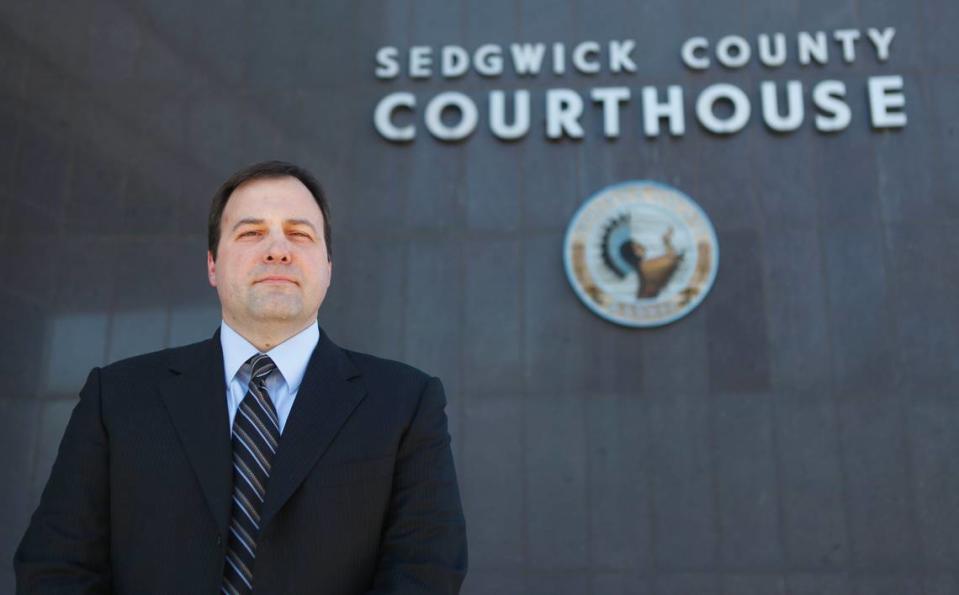Carr brothers can still appeal death penalty after Supreme Court ruling, DA and AG say
Friday’s Kansas Supreme Court decision upholding the death penalty for Jonathan and Reginald Carr is a significant step, but don’t expect their execution to happen anytime soon, state and federal prosecutors said.
The decision exhausts the Carr brothers’ direct appeals of their death sentences stemming from their murder, torture, rape and robbery spree in December 2000.
But there are still several avenues of appeal open for the Carrs that will delay their execution indefinitely, said Attorney General Derek Schmidt and Sedgwick County District Attorney Marc Bennett.
“The defendants now have the opportunity, under both state and federal law, to seek further judicial review of their cases,” Schmidt said in a written statement. “But completing these direct appeals is an important milestone in the path toward justice for the horrific crimes these defendants committed and the innocent lives they took.”
In a Friday teleconference with reporters, Bennett outlined the steps still to be taken before the Carrs can be executed.
The Carrs can and likely will request review of their cases by the U.S. Supreme Court, through a process called a “writ of certiorari,” Bennett said
The Carrs’ cases have already been to the U.S. Supreme Court once. In that instance, the federal justices reversed a 2014 decision by the state Supreme Court to reduce their sentences to life without parole.
While the Supreme Court would be unlikely to rule differently the second time around, going through the process will delay execution by several months at least, Bennett said.
Assuming the Supreme Court doesn’t take the case, Bennett said there are three main lines of appeal still open to the Carrs that are common in capital murder cases.
▪ The first will be what’s called “collateral attack” appeals where they can argue that their counsel did not represent them effectively.
▪ The second will be habeus corpus appeals where they can raise issues such as whether the method of execution, in this case lethal injection, constitutes cruel and unusual punishment under the constitution.
▪ The third will be a last-ditch request for clemency from the governor. Kansas grants its governors the exclusive power to pardon criminals and commute criminal sentences. A three-member Prisoner Review Board made up of Department of Corrections officials reviews clemency petitions and advises the governor.
On Friday afternoon, Gov. Laura Kelly largely deflected a question of whether she’d allow the Carr executions to go forward, saying she hadn’t heard about the state Supreme Court upholding their death sentence.
“I am not aware of that,” the governor said at a bill signing ceremony about four hours after the court decision. “But you know, the death penalty is legal in the state of Kansas and there’s nothing I can do about that at this point. So if that’s what the courts have ruled, that’s what the courts have ruled.”
The Carr brothers were sentenced to death for a brutal home invasion in December 2000 that included robbery, rape, torture and eventually the execution-style murders of four people. It was part of a six-day crime spree that left one other person dead.
Jason Befort, 26; Brad Heyka, 27; Aaron Sander, 29, and Heather Muller, 25, died in the home attack. A fifth victim survived. The Carrs later were linked to two earlier crimes, including the shooting death of Wichita symphony cellist Linda “Ann” Walenta, 55.
Bennett was a prosecutor in the district attorney’s office in 2002 when the Carr brothers were tried, but was working another murder at the time. The case was primarily handled by then-District Attorney Nola Foulston and Deputy DA Kim Parker.
Bennett became the district attorney in 2012 and has coordinated the appellate process with the state.
Although the decision to try the Carrs together took the case up to the U.S. Supreme Court and back, Bennett said he’s not sure whether it would have gone any faster if they’d been tried separately.
Other Kansas capital murder cases where co-defendants are not an issue don’t seem to be going much, if any faster, he said. “It’s not as if this is on some uniquely slow track,” Bennett said.
He said the slow pace of Kansas cases is largely because the state didn’t reinstate the death penalty as early as states such as Texas and Virginia, where executions are regularly carried out.
The main difference is those states have already resolved a lot of the legal questions that Kansas is still grappling with, he said.
“They’ve had somewhere on the order of 45 years of case law instead of truly, only about 20 years for us,” Bennett said.
Executions across the country were banned as unconstitutional by the U.S. Supreme Court from 1972 to 1976.
Kansas didn’t reinstitute the death penalty until 1994.
The last execution carried out by Kansas authorities was in 1965, when the state hanged George Ronald York, 18, and James Douglas Latham, 19, on the same day for the 1961 murder of a railroad worker.
The two teen-aged soldiers committed the crime after escaping from a stockade at Fort Hood, Texas, where they’d been held on military charges of being absent without leave.
The last death-penalty commutations by a governor came in 1960, when Gov. George Docking, who was opposed to capital punishment, commuted two death-row inmates’ sentences as his term in office ended.
Contributing: Katie Bernard and Jonathan Shorman of the Kansas City Star


